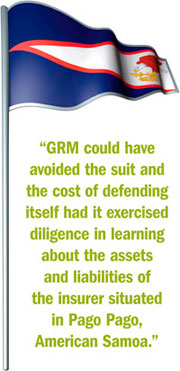 The New Jersey Superior Court, Appellate Division, was called upon to resolve a dispute between Andres Espinoza and GRM Enterprises, U-Save Auto Rental aka Almost New Rentals (collectively GRM), and Lincoln General Insurance Co. (LGI) (collectively, “defendants”) in Andres Espinoza v. Darnell R. Thompson, Darnell M. Thompson, American Transports, No. A-1427-10T3 (N.J.Super.App.Div. 01/10/2012).
The New Jersey Superior Court, Appellate Division, was called upon to resolve a dispute between Andres Espinoza and GRM Enterprises, U-Save Auto Rental aka Almost New Rentals (collectively GRM), and Lincoln General Insurance Co. (LGI) (collectively, “defendants”) in Andres Espinoza v. Darnell R. Thompson, Darnell M. Thompson, American Transports, No. A-1427-10T3 (N.J.Super.App.Div. 01/10/2012).
The plaintiff was injured when the bicycle he was riding struck the passenger door of a vehicle operated by defendant, Darnell R. Thompson, and owned by GRM. Thompson had rented the car from GRM. Thompson was a passenger in the car at the time, although it is unclear from the record whether he opened the door that struck plaintiff. Plaintiff filed a negligence complaint against Darnell R. Thompson and GRM.
Recommended For You
Want to continue reading?
Become a Free PropertyCasualty360 Digital Reader
Your access to unlimited PropertyCasualty360 content isn’t changing.
Once you are an ALM digital member, you’ll receive:
- Breaking insurance news and analysis, on-site and via our newsletters and custom alerts
- Weekly Insurance Speak podcast featuring exclusive interviews with industry leaders
- Educational webcasts, white papers, and ebooks from industry thought leaders
- Critical converage of the employee benefits and financial advisory markets on our other ALM sites, BenefitsPRO and ThinkAdvisor
Already have an account? Sign In Now
© 2025 ALM Global, LLC, All Rights Reserved. Request academic re-use from www.copyright.com. All other uses, submit a request to [email protected]. For more information visit Asset & Logo Licensing.








